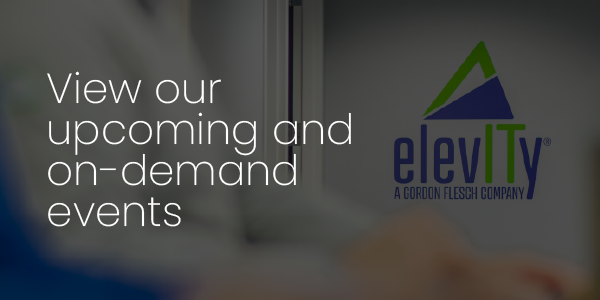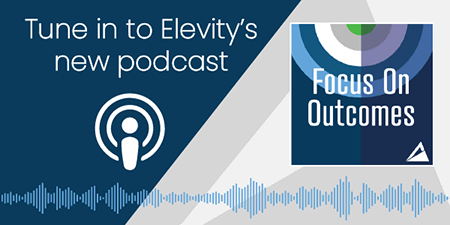Choosing the right cloud service provider can feel a little overwhelming—there are a lot of options out there and not all of them will be the right fit for your business. That’s where we come in.
At Elevity, our experienced virtual Chief Information Officers (vCIOs) work closely with organizations like yours to help navigate the cloud landscape and find a provider that aligns with your goals, budget and long-term strategy. We’re here to make the process easier, more strategic, and a whole lot less stressful.
While there are a lot of moving pieces to consider when conducting a cloud provider comparison, here are five key points that we often recommend to keep in mind:
- Ask About Their Certifications, Standards and Best Practices
- Learn About Their Stance on Data Governance and Security
- Read the Fine Print in a Provider’s Contracts & SLAs
- Research the Provider’s Reliability & Performance
- Avoid the Risk of Vendor Lock-In
RELATED: Building an IT Strategy
1. Ask About Their Certifications, Standards and Best Practices
When you're evaluating cloud service providers, one of the first things to check is whether they follow recognized industry standards and best practices. Think of certifications like ISO 27001 or SOC 2 as a provider’s way of saying, “Hey, we take security and quality seriously!”
These certifications aren’t just fancy acronyms—they’re proof that the provider has gone through rigorous assessments to ensure they’re handling your data responsibly and securely. Even if certifications aren’t the deciding factor, they’re a great way to narrow down your list of potential partners. Especially if security or compliance is a top priority for your business, these credentials can give you peace of mind right out of the gate.
So don’t be shy—ask providers what certifications they hold, how often they’re audited, and what frameworks they follow. A trustworthy provider will be more than happy to share that information with you.
2. Learn About Their Stance on Data Governance and Security
Let’s talk about data. Because where it lives, how it’s protected, and who has access to it really matters.
Most businesses already have some kind of data classification system in place, especially if they deal with sensitive or regulated information. But even if you’re just starting to think about it, that’s okay. One thing’s for sure—you need to understand the rules that apply to your data. This is especially important when it comes to privacy and compliance.
One big factor? Location, location, location. Where your data is stored can determine which laws apply to it. So, if your business has specific regulatory requirements, make sure your cloud provider gives you control over where your data is stored, processed and managed. A good provider will be upfront about their data center locations and won’t leave you guessing.
Also, don’t forget to ask about their policies for handling data breaches or data loss. How quickly will they notify you? What’s their plan if something goes wrong? Their answers should align with your company’s risk tolerance and any legal obligations you have.
Bottom line: transparency is key. You want a provider who treats your data with the same care and respect that you do.
3. Read the Fine Print in a Provider’s Contracts & SLAs
Let’s be honest, cloud contracts and service level agreements (SLAs) aren’t exactly light reading. They can be full of legal jargon and tech-speak that makes your head spin. And since there’s no universal standard for how these documents are written, it’s easy to get lost in the weeds.
But here’s the thing: the fine print matters. A lot.
Make sure the contract clearly spells out important details like who owns your data, where it’s stored and how it’s protected. You’ll also want to see guarantees around data access, confidentiality and jurisdiction—especially if you have compliance requirements to meet.
When it comes to SLAs, look for specifics. How are issues reported and resolved? Who’s responsible and how quickly will they respond? Vague promises won’t cut it. You want clear, measurable commitments.
And don’t be afraid to dig deeper. Ask for things like internal security audit reports, incident logs and proof that they’ve taken action when problems have come up. A trustworthy provider won’t hesitate to show you how they walk the talk.
4. Research the Provider’s Reliability & Performance
When it comes to cloud services, reliability is everything. After all, if your systems go down, your business could come to a screeching halt. So how do you know if a provider is truly dependable?
Start by looking at their track record. Many providers publish performance reports showing how well they’ve met their SLAs over the past 6 to 12 months. If they don’t make that info public, don’t be afraid to ask for it. A solid provider should be transparent about their uptime and how they handle issues.
Now, let’s be real. No provider is perfect. Because downtime happens. What really matters is how they respond when things go wrong. Do they communicate clearly? Do they fix issues quickly? That’s what separates the good from the great.
Also, take a close look at the monitoring and reporting tools they offer. Are they robust enough for your needs? Can they integrate with your existing systems? These tools are key to keeping tabs on performance and spotting problems before they escalate.
And don’t forget about disaster recovery. Ask about their backup processes, recovery timelines, and how they’ll support you if the unexpected happens. You want a provider who’s ready for anything—just like you are.
5. Avoid the Risk of Vendor Lock-In
Nobody likes feeling stuck, especially when it comes to your cloud provider. Vendor lock-in happens when switching to another provider becomes difficult, expensive or downright impossible. And it’s more common than you might think.
Sometimes it’s due to proprietary technology that doesn’t play well with others. Other times, it’s clunky processes, restrictive contracts or a lack of support for migration that keeps you tied down.
To avoid this trap, look for a provider that keeps things flexible. Ask about their use of open standards and whether they support easy data migration. The goal is to make sure you’re not locked into a long-term relationship that no longer serves your business.
A good provider will want to earn your loyalty. Not trap you into it.
However, before you make your final decision, it’s also worth taking a quick look at the financial health and overall stability of the providers on your shortlist. Even the most feature-rich, secure and high-performing cloud service won’t do you much good if the company behind it isn’t built to last. You want a partner that’s not only a great fit today, but one that’s going to be around—and growing with you—for the long haul.
Of course, these are just a few of the key things to keep in mind when choosing the right cloud service provider for your business. If you’re feeling overwhelmed or just want a second opinion, the cloud experts at Elevity are here to help. Whether you’re starting your search or digging into the details of a specific provider, we’d be happy to guide you through the process and make sure you find the perfect fit.











%20cropped.webp?width=200&height=200&name=Alec_Brown%20(Pro)%20cropped.webp)




